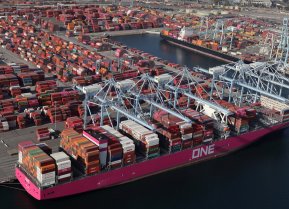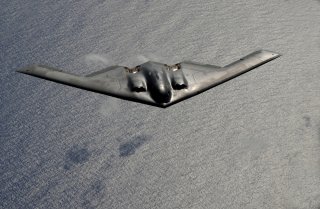Former Trump NSA Robert C. O'Brien: Air Force Needs 300-400 B-21 Raiders
In comments given to the National Interest, former Trump National Security Advisor Robert C. O'Brien explained that the U.S. Air Force needs 300-400 B-21 Raider stealth bombers considering the growing threat from China's rising military might.
In comments given to the National Interest, former Trump National Security Advisor Ambassador Robert C. O'Brien explained that the U.S. Air Force needs 300-400 B-21 Raider stealth bombers considering the growing threat from China's rising military might.
O'Brien's B-21 comments are significant considering the role he could play in a future Republican Administration in 2025 and beyond, helping set defense and national security policy.
O'Brien was considered by most who observed the Trump national security team up close in Washington as knowledgeable, politically connected, and able to move between the MAGA/populist wing of the GOP and more neoconservative elements.
Many Republican defense hawks would consider O'Brien an excellent pick for Secretary of Defense, State, or even an outside chance at Vice President.
The B-21 Raider: '300-400 Range'
"The U.S. Air Force has placed an initial order for 100 Raiders. It has acknowledged a need for 175-200 bombers. In light of the rapidly growing PLA Navy fleet and recent reporting that the PLA Rocket Forces are building 1,000 ICBM silos, it is clear that the B-21 fleet should be in the 300-400 range," explained O'Brien to the National Interest.
"Although the [B-21 Raider] program has been well run to date, given the poor performance of the Pentagon on recent major programs such as LCS and F-35, I am not sure the Air Force will ever reach the needed numbers for its bomber fleet."
'At Least 200' Needed: Other Conservative Military Analysts Agree on B-21
Mackenzie Eaglen, a prominent defense analyst for the right-leaning American Enterprise Institute, or AEI, also had high hopes for a large fleet of new B-21 Raider bombers regarding the threat from China but explained that challenges remain.
"America’s bombers are unique instruments of national power projection capable of striking any target, anywhere, at any time and therefore bolstering deterrence—or the prevention of war," explained Eaglen
She continued, noting that: "The Air Force’s new medium bomber means the United States is the only country on the planet that can hold targets at risk inside mainland China. This capability to carry more and larger missiles and sensors is especially needed at a time when it is increasingly harder to outrun, avoid, or defeat enemy missiles. Absent this new bomber capability, tomorrow could be the day Xi Jinping wakes up and decides using force to take Taiwan is a reasonable bet for his regime and his military.
But America’s bomber gap is wide and growing. The bomber fleet has plummeted from a high of over 400 aircraft at the end of the Cold War to today’s dangerously low level of 141. Global requirements currently demand an additional 50 Raiders above current plans of 100 or so.
But even the ambitious plans of the previous two national defense strategies are likely underestimating the expenditure rates of modern combat against highly-capable adversaries, or what would be required of bomber fleets in two conflicts simultaneously. The United States must avoid getting mugged by reality and build in slack and margin for its bomber fleet of this century and field at least 200 B-21s."
O'Brien Seems Prescient on B-21 Challenges
While many analysts and top policymakers agree that the B-21 Raider is vital to the U.S. Air Force, building the new B-21 stealth bomber in large numbers won't be easy, something NSA O'Brien and Eaglen seemed to be hinting at.
A recent article in Forbes magazine argued that large numbers of Raider bombers won't be easy to field quickly as only ten can be acquired per year - by sometime in the 2030s.
About the Author and His Expertise
Harry J. Kazianis (@Grecianformula or Email: [email protected]) is the new Senior Director of National Security Affairs at the Center for the National Interest. He also serves as Executive Editor of its publishing arm, The National Interest. He previously served as part of the foreign policy team for the 2016 presidential campaign of Senator Ted Cruz and the John Hay Initiative. Kazianis, in the past, also managed the foreign policy communications efforts of the Heritage Foundation, served as Editor-In-Chief of the Tokyo-based The Diplomat magazine, and as a WSD-Handa Fellow at the Center for Strategic and International Studies (CSIS): PACNET. Kazianis has held foreign policy fellowships at the Potomac Foundation and the University of Nottingham. He has provided expert commentary, op-eds, and analysis for many outlets, including The Wall Street Journal, Yonhap, The New York Times, Hankyoreh, The Washington Post, MSNBC, Fox News, Fox Business, CNN, and others.
Image: Shutterstock.


